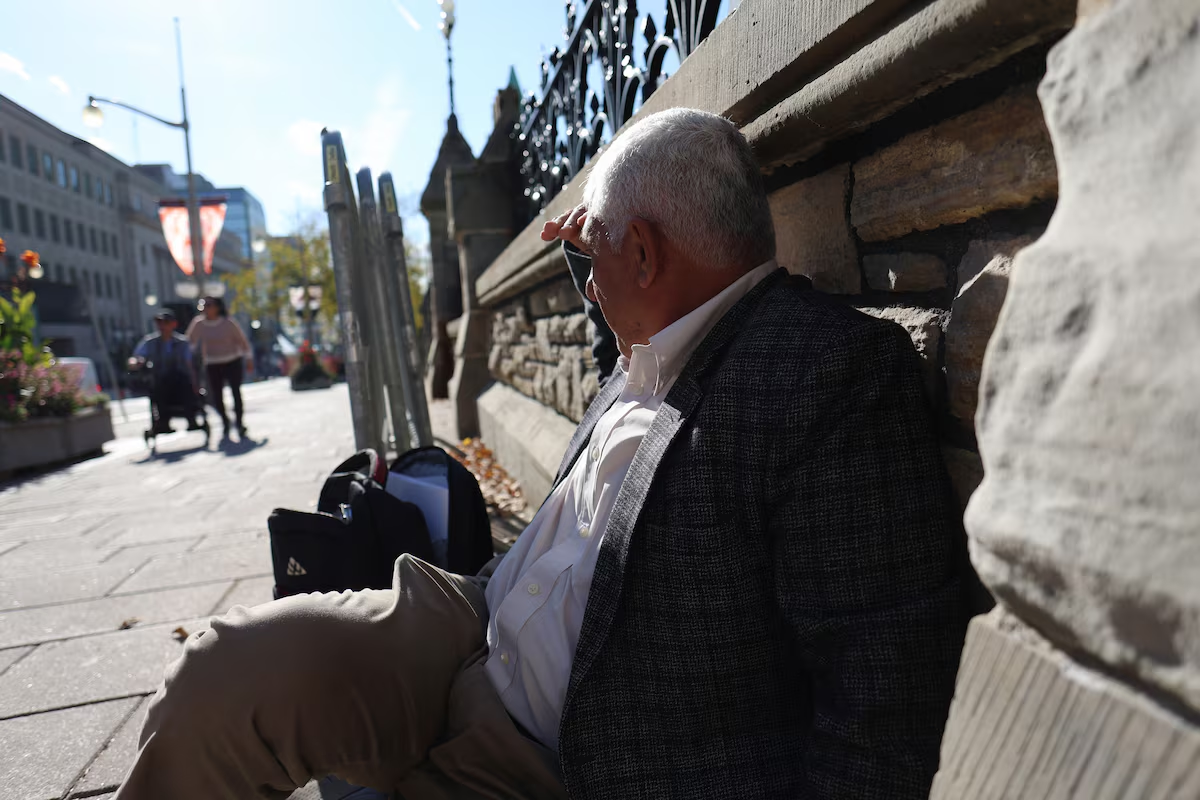Afghan professor camps outside Parliament in despair over children facing deportation

Open this photo in gallery:
A man being identified as Mohammad protests on the front steps of Parliament Hill in Ottawa on Oct. 6, 2025.Dave Chan/The Globe and Mail
A former Afghan professor who camped outside Parliament for weeks to raise the plight of his two eldest children facing deportation from Pakistan says he fears for their lives as they wait for the Immigration Department to assess their applications to join their family in Canada.
Mohammad sat outside the House of Commons for 23 days, including in the pouring rain, until earlier this month to try to speak to MPs about his daughter and son left behind in Pakistan.
The Globe and Mail is only using his middle name and not naming his children as they fear reprisals from the Taliban if the two are deported.
Mohammad fled to neighbouring Pakistan from Afghanistan after the Taliban retook control in 2021. While he, his wife and their five younger children were granted visas to come to Canada in December, 2023, his two eldest remained in Islamabad, with the aim of joining them later.
His daughter, who is now 25, had nearly completed her studies to become a dentist, while his son, 23, was a student of computer science.
Editorial: The lesson from Afghanistan that Canada has yet to learn
A young Afghan and her family were about to be deported back to the Taliban. One text changed everything
Mohammad and the rest of his family are now all permanent residents living in Surrey, B.C. He submitted applications for his two older children to join them. But they were refused, as under Immigration, Refugees and Citizenship Canada rules, they were too old to join the rest of the family.
IRCC spokesperson Matthew Krupovich said that “Afghans are part of a vulnerable population,” but it will not comment “to protect the privacy and security of the individuals concerned.”
Pakistan has been deporting Afghans, and is refusing to renew their visas.
According to Amnesty International, since Pakistan introduced its “Illegal Foreigners’ Repatriation Plan” two years ago, more than one million Afghan refugees and asylum seekers have been forced to return.
Pakistan is now targeting holders of Proof of Registration cards issued by the UN Refugee Agency that were held by at least 1.4 million Afghan refugees.
Open this photo in gallery:
Mohammad applied for his two oldest children to join the family in Surrey, B.C., but they were refused and remain in Pakistan, which is now targeting people who hold UN-issued Proof of Registration cards for deportation.Dave Chan/The Globe and Mail
Mohammad is fearful that his eldest children will be sent back to Afghanistan, where the Taliban have been persecuting some who fled the country. After contacting his local MP in B.C., who told him their applications had been rejected because of their age, the former language professor at Kabul and Paktia universities came to Ottawa in the hope of raising their case.
The expert in the Pashto language sat quietly at the bottom of the stairs into Parliament’s West Block for weeks.
Most MPs ignored him, even though he had fixed a huge laminated sign to a temporary security barrier explaining that his children’s lives were in danger as they were facing deportation back to Taliban-controlled Afghanistan.
Saunders: In its bid to rescue Afghans, Ottawa is fracturing their families
One of the few MPs who read the sign and stopped was Marc Miller. Mohammad had no idea that the MP asking for technical details about his children’s application and for copies of paperwork was the former immigration minister.
Mr. Miller wondered if Mohammad had somehow filled the initial application for his daughter to join him incorrectly. He has queried the case with officials at his old department.
“I feel for him on a personal level,” Mr. Miller said, adding “we can’t help everyone.”
“We’re still looking at options, but I don’t see a quick path for the rest of the family.”
Mohammad and his wife have been supporting their children in Pakistan by sending payments drawn from his family’s B.C. benefits. But he says a further clampdown by the Pakistani authorities on Afghans whose visas have expired means he can no longer send them money orders in their names.
In September last year, he managed to get them on a waiting list for sponsorship to come to Canada through the Vancouver Unitarians church. But it could take years for their application to be considered by IRCC because there are so few spaces available. The Unitarians declined to comment on his case.
Little work, a failing banking system, thousands of internal refugees and no foreign aid is pushing Afghanistan’s weakened economy to the verge of complete collapse. Senior International Correspondent Mark MacKinnon is on the ground in Kabul.
The Globe and Mail
The number of applications to IRCC for private sponsorship of refugees has far exceeded the 23,000 spaces allotted for them this year in 2024’s Immigration Levels Plan. In November last year, IRCC paused new applications from community sponsors until the end of 2025.
NDP immigration spokesperson Jenny Kwan said Mohammad’s situation is emblematic of the jeopardy many Afghans are facing.
“The government needs to move with urgency regarding family members who have been left behind and they should have flexibility on the age-out policy for young dependants who are single,” she said, especially “single women who are in an extremely vulnerable position.”
Mohammad said the division of his family has driven his wife and son in B.C. into depression and is causing his family great strain.
Mohammad had originally planned to stage a vigil outside Parliament day and night, and had brought blankets to sleep on. But a police officer told him this was not permitted. When the Ottawa hostel he was staying at became too expensive, he found a cheaper one in Gatineau, Que., but after 23 days he returned to B.C. as the cost of staying in Ottawa was proving prohibitive.
One elderly woman, saddened by his situation, paid for a night’s hostel stay.
“One day it rained all day. At one point, I thought to myself that I should go back to the hostel – it was not a suitable day to sit there – but then I said to myself that maybe I would miss a chance to resolve my issue,” he said.
The former professor said his journey was not fruitless, however. He said he will never forget the “sincerity, effort and the compassion and kindness” of people, especially Mr. Miller, who took the trouble to stop and try to help.





